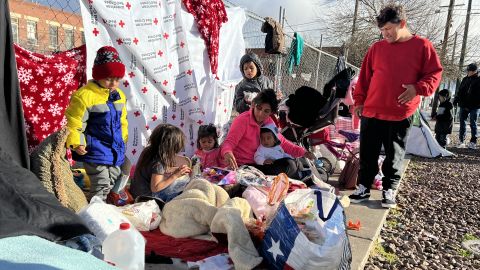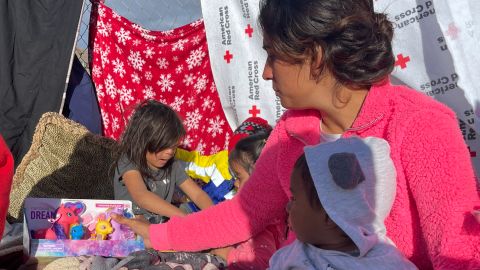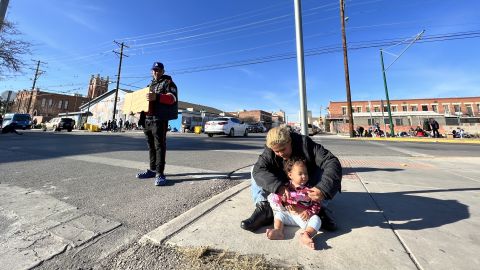El Paso, Texas
CNN
—
One-year-old Brenda’s tiny feet are bare on the cold asphalt of an El Paso parking lot as the harsh reality starts to sink in for her parents. They are undocumented. They are homeless. And their daughter barely escaped death when they crossed the Rio Grande.
“My daughter would have died because she was super frozen,” said Glenda Matos.
Matos’ pain is clear in her eyes as she recalls her daughter being drenched, in the freezing cold, all while crying hysterically. Matos and her husband, Anthony Blanco, say they had nothing to keep their daughter warm, not even body heat, because they, too, were wet and cold.
Matos says she hugged Brenda tightly and ran from house to house begging for help until they finally found a kind El Paso resident who helped them with clothes and shelter.
“I asked God for help,” Glenda said. “God… put those people in my way.”
For Matos, the tiny red rosary with an image of Our Lady of Guadalupe, hanging from Brenda’s ancle, saved them. Matos says she wrapped the religious token on her daughter’s little body for protection when they left their native Venezuela.
Brenda and her parents are some of the hundreds of migrants living in squalor in the streets of downtown El Paso around Sacred Heart Parish. The makeshift camp – with its piles of blankets, strollers and tents lining both sides of a busy street – has city officials expressing concerns about safety and public health given the area is packed with migrants who have no running water or proper shelter.
The surge of migrants aggregating here started a few weeks ago, when anxiety about the scheduled end of the Trump-era pandemic public health rule known as Title 42 prompted thousands of migrants to turn themselves in to border authorities or to cross into the United States illegally in a very short period of time.
Title 42 allows immigration authorities to swiftly return some migrants to Mexico. The policy was scheduled to lift last week, but a Supreme Court ruling kept the rule in place while legal challenges play out in court.
While the impact of the ruling has sent ripples throughout the southern border, the scene in El Paso is one of a kind. It’s the only U.S. border town where hundreds of migrants are living in the streets longer than expected. It’s a new phenomenon that city officials say had never happened during prior migrant surges.
It’s driven, in part, by the anxiety created by the uncertainty of Title 42, which motivated some migrants to cross the border illegally. These migrants don’t have family or sponsors in the US to receive them. And many also fear that traveling out of town without the proper paperwork could lead to apprehension by US immigration authorities.

The misery around Sacred Heart Parish is palpable. Evelyn Palma has blankets hooked and draped on a chain-linked fence to keep the cold and the drizzle from hitting her five children, ages 1 to 8, some of them shirtless. She’s been living on the street for eight days. But Friday was especially miserable because it was 40 degrees and it poured overnight.
“We woke up drenched,” Palma said.
The 24-year-old mother from Honduras says she and her children turned themselves in to immigration authorities earlier this month, but they were swiftly returned to Mexico, likely under Title 42. That’s why, she says, that a week ago she decided to evade authorities by crossing the river.
She is part of the growing number of migrants who El Paso city officials say have decided to enter the US illegally and, for various reasons, have not left the city.
“They are people who came into the country in anticipation of Title 42 going away,” said Mario D’Agostino, El Paso’s deputy city manager.
The living conditions Palma and other migrants are enduring has officials concerned about their safety and overall public health. City spokesperson Laura Cruz-Acosta says that the spread of disease is top of mind.
“We are still in the middle of what is being called a ‘tripledemic,’ with continuing high infection levels of upper respiratory infections across the community,” Cruz-Acosta said.

And while the city has space for about 1,500 migrants at shelters that have been erected at the convention center and at a public school, those beds are only offered to migrants who have turned themselves in to border authorities and have been allowed to stay in the US pending their immigration cases. Those migrants receive documentation from US Customs and Border Protection that allows them to travel within the country.
Migrants who enter the country illegally are not offered city-provided shelter because federal dollars are being used to foot the bill. And those monies can’t be used to serve people who entered the country illegally, according to D’Agostino.
City officials have been referring undocumented migrants to non-profit organizations and churches like Sacred Heart Parish, which turns into a shelter when night falls.
That’s why hundreds of migrants aggregate on the streets around the church, hoping to score one of the 120 to 130 slots to enter the church for the night.
Around 6 p.m., a line of migrants forms outside the church’s gymnasium. Parents can be seen clutching their children to try to keep them warm. Women and men with children are given priority, according to Rafael García, the priest that runs the shelter. García says it’s tough to send people away but that his church has limited resources to serve the growing need.
Angello Sánchez and his 4-year-old son Anyeider were allowed into the shelter for the night several times this week. The Colombian father says he was trying to protect his son from the cold because his little face still had windburn from being out in the elements during the recent freeze.
“I got here from southern Mexico on a train. It was so cold and he wasn’t wearing any jacket,” Angello said.
Palma, the mother of five, says she was offered entry into the shelter with her children but decided not to take the offer because a pregnant friend who is accompanying her was denied access.
El Paso, which means “The Pass” in Spanish, has historically been a gateway for migrants passing through into the United States.
“For hundreds of years people have been passing through and it’s just part of their journey,” D’Agostino said. “In normal times the community doesn’t even realize it.”
But this migrant surge is different because migrants are staying for days and even more than a week, city officials say.
Besides lacking family or sponsors in the US to receive them, many migrants don’t have money to pay for their transportation out of the city. And in the makeshift migrant camp around Sacred Heart Parish, word is spreading about another factor that has some undocumented migrants hunkering down in El Paso: The fear of getting detained at immigration checkpoints located in the interior of the US.
In the last week, at least 364 undocumented migrants who were traveling in commercial buses headed to northern cities were detained at these immigration checkpoints, according to tweets posted by El Paso’s border patrol chief.
Palma says she heard about the checkpoints and the apprehensions and decided to stay in El Paso longer while she figures out what to do.
“If immigration detains me, they’ll return me,” Palma said.
Juan Pérez, from Venezuela, was down the street and said that “immigration is in the exits [of the city]… they’ll return us and send us to Mexico.”
The US has 110 Border Patrol checkpoints in the southern and northern borders, where vehicles are screened for the “illegal flow of people and contraband,” according to a recent US Government Accountability Office report. The checkpoints are usually between 25 and 100 miles from the border, according to the same report.

Anthony Blanco says he’s not afraid of being detained at these interior checkpoints.
“I’ve walked through many different countries without documents. I don’t think we’re going to be detained, but if that happens, it was God’s will,” Blanco said.
For days this week, Blanco has been holding a sign on the street corner that reads, “Help me with work so I can support my wife and baby,” and asking drivers who pass by for money for bus tickets to Denver.
Why Denver? He says word has spread that there is work there and living is more affordable.
Friday morning, a day which was especially miserable because it was cold after a hard overnight rain, Blanco was all smiles. He says he had collected enough money to continue his journey to Denver.
“Thank God,” Blanco said.